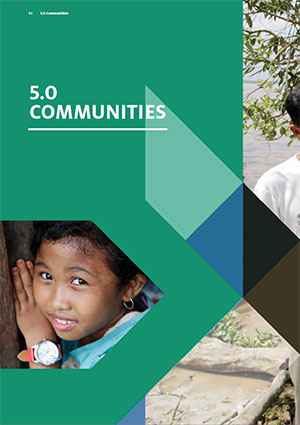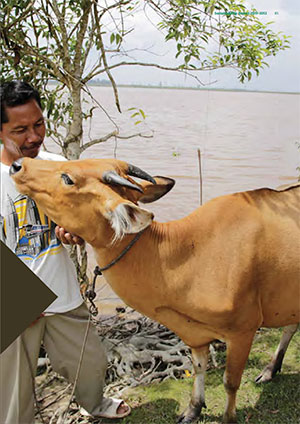Launch of Blueprint for Sustainable Community Development
For almost two decades, APRIL has been implementing community development in Riau Province, to help alleviate poverty and improve quality of life through economic development, health, education and social infrastructure programmes.
Over the last two years we have reexamined our programme design and delivery mechanisms. Our aim was to achieve better outcomes from sustainable programmes tailored to individual communities. Programmes in areas such as health and education which were found to have overlapping objectives with existing government initiatives, were refocused to avoid duplication of efforts, and to ensure maximization of resources for more effective outcomes.
In October 2011, APRIL launched a new community development initiative that focused directly on self-reliance. Called the "Eco Village Development Programme" (EVDP), it served as a blueprint for a new approach to community development.
While self-reliance has always been a priority in our work with communities, EVDP places a greater emphasis on enabling self-reliance though the creation of long-term and sustainable economic activity with low environmental impacts, based on local resources.
With this new approach, we are aiming to bring real, positive change to the lives of thousands of people.
The EVDP pilot programme was launched in the villages of Desa Sering* and Teluk Binjai*, home to 2,800 people in 800 households. Nine months after the launch, the following income-generating activities had been established.
Given the success of these initiatives, APRIL is examining the application of the EVDP model to 150 villages where community programmes are already in place.
1. Freshwater fish cultivation
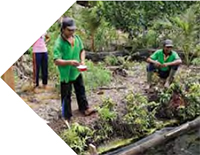 In the village of Teluk Binjai, community members were trained to cultivate fish in ponds they constructed from tarpaulins, supported by timber frames. The programme began with a visit to an established fish cultivation facility and included training in pond building and fish breeding. APRIL provided all training and materials needed for six ponds. We are also providing ongoing assistance and training in management
In the village of Teluk Binjai, community members were trained to cultivate fish in ponds they constructed from tarpaulins, supported by timber frames. The programme began with a visit to an established fish cultivation facility and included training in pond building and fish breeding. APRIL provided all training and materials needed for six ponds. We are also providing ongoing assistance and training in management
and maintenance.
2. Local handicrafts
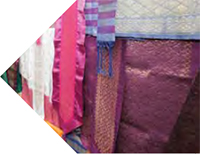 Our community development staff also worked with the women of Desa Sering and Teluk Binjai to establish local handicrafts businesses. APRIL helped foster these initiatives by facilitating meetings, monitoring the development of handicraft products, providing handicraft training, and assisting with sales, marketing and exhibition of products.
Our community development staff also worked with the women of Desa Sering and Teluk Binjai to establish local handicrafts businesses. APRIL helped foster these initiatives by facilitating meetings, monitoring the development of handicraft products, providing handicraft training, and assisting with sales, marketing and exhibition of products.
3. Cattle farming
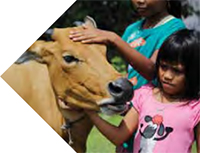 In Teluk Binjai, APRIL supported the expansion of an existing cattle farm. Training for 29 community members covered areas such as animal husbandry and management, as well as production of compost from cow manure, a new business venture for farmers. APRIL provided 28 bulls and helped establish two farming groups.
In Teluk Binjai, APRIL supported the expansion of an existing cattle farm. Training for 29 community members covered areas such as animal husbandry and management, as well as production of compost from cow manure, a new business venture for farmers. APRIL provided 28 bulls and helped establish two farming groups.
4. Compost fertilizer development
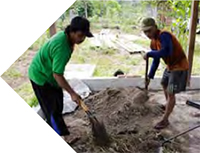 In Teluk Binjai, a community initiative that has met with early commercial success is the production of liquid organic fertilizer made from composted water hyacinth plants (known locally as "Kiambang"). The process, which uses the bioactivator EM-4, has gained commercial interest from a local palm oil company. The initial training phase was attended by 40 people, but with small amounts of fertiliser being sold, opportunities now exist to increase the scale of this venture.
In Teluk Binjai, a community initiative that has met with early commercial success is the production of liquid organic fertilizer made from composted water hyacinth plants (known locally as "Kiambang"). The process, which uses the bioactivator EM-4, has gained commercial interest from a local palm oil company. The initial training phase was attended by 40 people, but with small amounts of fertiliser being sold, opportunities now exist to increase the scale of this venture.
